Published Jun 18, 2020
Finding Pride on Deep Space Nine
DS9 shows fans a future beyond the gender binary. ????
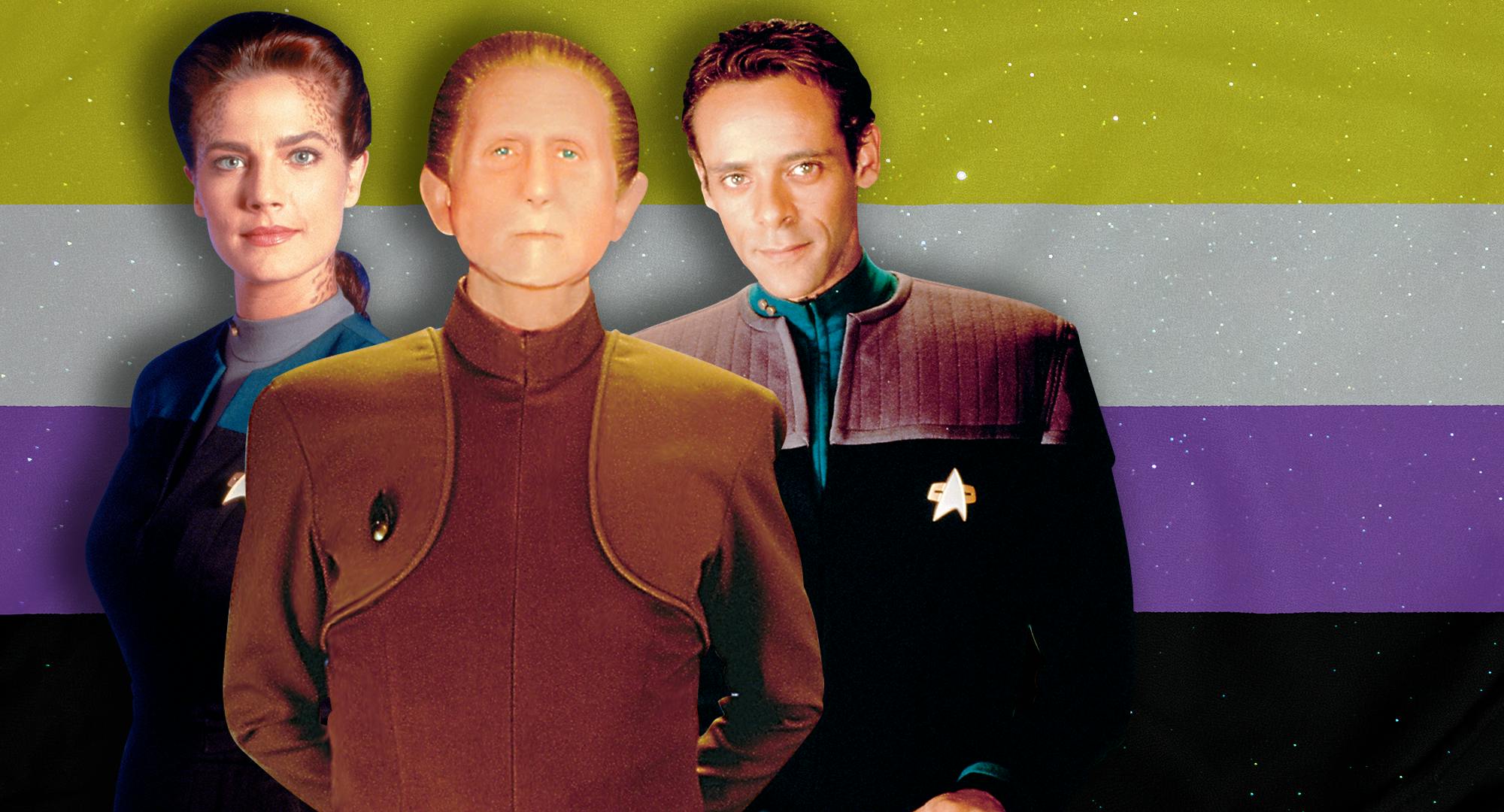
StarTrek.com | Shutterstock/somemeans, McCarthy's PhotoWorks
I first became a Star Trek fan when Star Trek (2009) came out, but the franchise didn’t really change my life until this year.
Since early 2020, I have been questioning my gender, and ultimately have come to realize that I’m non-binary. Such a statement inspires both freedom and fear. The idea of being freed from the confines of a particular gender is a deeply appealing idea, but the prejudice and ignorance one often faces when coming out as non-binary is also a frightening thought. So, as I puzzled over gender, I turned to Star Trek.
This is not necessarily a new course of action, as Star Trek has helped me through rough patches in the past. But this time, I didn’t look to it simply for comfort but for a sign of a future.
Given when it was written and produced, Star Trek: Deep Space Nine tends to adhere to a strict gender binary, but there are moments sprinkled through that make me feel seen as a non-binary person. Be it the smaller moments where queerness is acknowledged to the characters whose journeys make me feel like I too can live my truth, Deep Space Nine might be the one of the queerest Star Trek.
Jadzia is the obvious choice for understanding one’s gender through this particular series. As a host of the Dax symbiont, she possesses the memories of lives lived before, both male and female. As she strolls down the Promenade with Kira early on in the series, she remarks how interesting it is being a woman. A few episodes later, she reminds Bashir that she was a young man once too, so she understands his struggles.
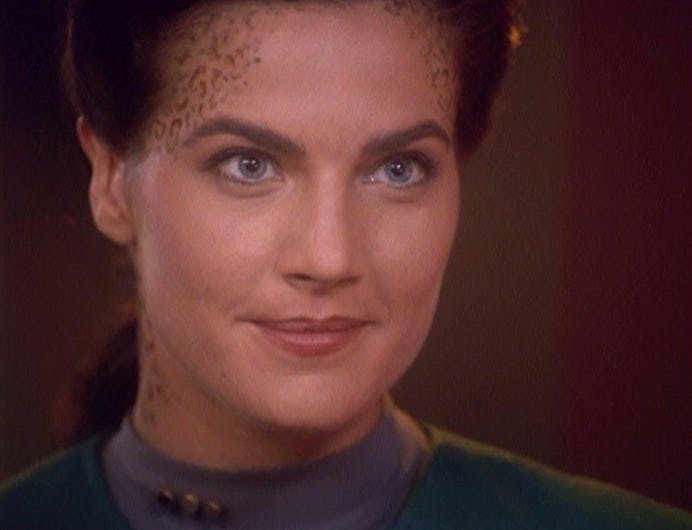
StarTrek.com
Above all else, Jadzia is a deeply queer character. She’s canonically pansexual, as evidenced by her love of both Worf and Lenara Kahn, and confirmed by actress Terry Farrell, and her gender seems very fluid. Sure, a 1990s based writers room might write her within a gender binary, but she seems to alternate between identifying with both her masculine and feminine pasts. She embraces her femininity as Jadzia, but as Dax she retains the knowledge she gained living with both female and male hosts, such as Curzon. She’s even referred to as “old man” by her close friend Benjamin Sisko.
Jadzia’s fluidity and sexuality make me feel visible. Here is a future where she seems to rise above our twentieth-century expectations to be herself, retaining gendered experiences but making her life her own. When society’s expectations don’t allow her to be herself in the most authentic way, by sharing her life with Lenara in the episode “Rejoined,” she is devastated and the narrative rightfully frames it so the audience mourns with her. When Jadzia finds love again with Worf, in a partner that accepts her for who she is, we cheer for her victory and root for her to continue to define who she is beyond the expectations placed on her by society.
As a non-binary person, I live in a society that is defined by the concept of a gender binary. I was socialized as one gender, and now I wish to escape the confines of both. I want to be free to be my own authentic self without having to exist within the trappings of a particular gender. Similarly, I long to move beyond the expectations of one gender’s traits, and to move through this world unencumbered by the concept of a specific gender and the expectations that come within that.
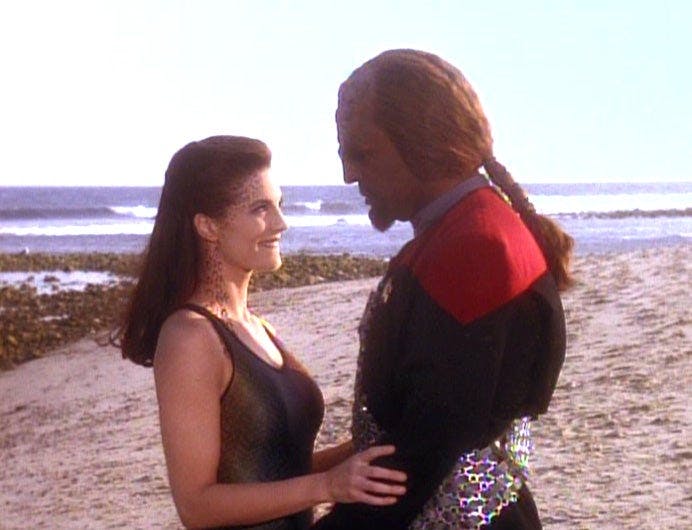
StarTrek.com
For me, the Dax characters allow me to see a future in which people are allowed to set their own authentic lives regardless of lived experiences or gender binaries. While there are missteps due to the time in which the show was written, Jadzia, and later Ezri, live their experiences with a passion and courage I want to embody in my own life.
Odo is another character whose journey I've looked to for hope. Changelings should have no concept of gender after all — they are shapeless yet sentient puddles of goo that exist in something called the Great Link. Odo chooses to present as a man, and he chooses his own path.
Odo hesitantly comes into his own throughout Deep Space Nine’s run. At first, he doesn’t see much in behaving like a humanoid or a solid, choosing to mostly isolate himself. He has a crush on Kira and a ‘frenemy’ bond with Quark, but other than that, he is alone. But over the course of the series, he begins to explore his past and what it means for his future, and slowly opens up to others.
In “The Die is Cast,” Odo admits that he wants to return home and have a sense of belonging. When you’re non-binary, or when you’re a member of the LGBTQ community, you want a sense of belonging too. The world likes to put us in neat, gendered, heterosexual boxes after all. Finding your community matters, though hopefully, it won’t be the Dominion.
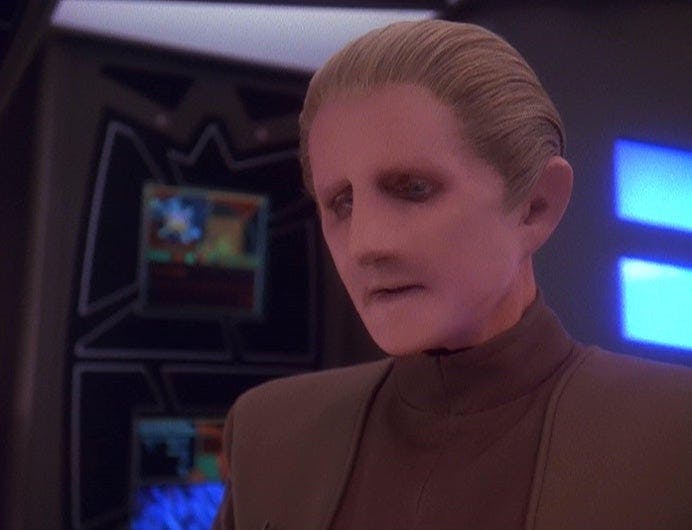
StarTrek.com
However, despite Odo’s fellow Changelings being more than a bit evil, he still finds a community of those who accept him for who he is. They don’t see him as a science experiment or as a party trick, but a loyal friend and an important colleague. They value him.
Like Odo, I longed for a sense of community as I began coming out. While my friends supported me, I had no idea how the world would react to this news. But if Odo can find his way to both an identity and a family, even while making mistakes and stumbling at times, I feel as though I can hope for that too. The community I’ll belong to is out there, I just have to find it, even if it takes a while.
And then there’s the Bashir of it all.
Julian Bashir became my favorite character on DS9 early on in season one, and I instantly connected with him. We both have a tendency to talk too much and to babble about whatever it is we’re interested in at the moment. We’re both dorks who like to dress up in costumes and pretend to be someone else for a little while. I admired his ability to be both a complete geek and a compassionate hero, oftentimes in the space of the same episode, and I hoped to mirror that balance of softness and courage in my own life.
And then came “Doctor Bashir, I Presume?” As Bashir raged against his parents and the way their love was always conditional and based on him living up to their expectations, I found myself weeping.
My relationship with my parents is strained at best. I bear the weight of their expectations, and their disappointment in knowing I’m just a little off from what they wanted. Just like Bashir’s parents only loved their son on the condition that he could excel, my parents love me conditionally, providing that I can live up to the expectations they have in mind. The similarities between Bashir’s father and my own parents hurts when I watched the episode, as did the slow dawning realization that if my family could’ve changed things about me on a genetic level, they absolutely would have.
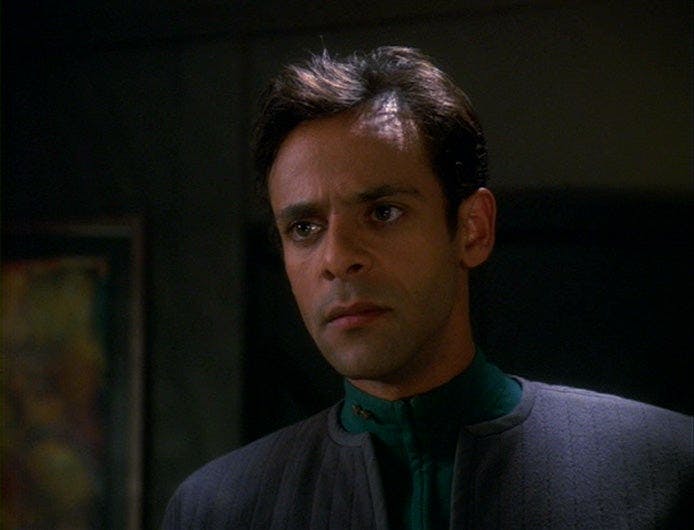
StarTrek.com
Bashir might’ve been the product of genetic engineering, but he’s more than just what his parents forced him to be at the age of six. His personality and the intrinsic things that make him Julian Bashir are more than a collection of genetic engineering; we’ve spent five seasons getting to know him, mistakes and successes alike, and there’s more to the character than one part of his past. By that point in the show, Julian had become his own person separate from his parents’ control, with a new family of his own making that, for the most part, supports and cares for him.
In my own way, I had to separate from my parents and come into my own. I moved away from them, and found my own little family. I stumbled and made mistakes along the way, but I have become who I am regardless of expectations. As I step into my own identity and take control of my gender and how I identify, I find myself freed from those expectations. I can form an identity that I feel comfortable in.
At the end of “I Presume?”, we’re expected to forgive Bashir’s parents when they finally call him by the name he prefers rather than their childhood nickname for him. Bashir is given the chance to embrace the identity he has built for himself. While I’m not sure I will ever come out to my parents, I can only hope that I too can find the courage to embrace my own identity.
Deep Space Nine might not have a great deal of canon representation, but even so, I can still see myself reflected in characters like Jadzia, Odo, and even Bashir. Most of the main characters on DS9 are on journeys to find who they are, regardless of their experiences or their pasts, and through their struggles to become the people they want to be I can see my own journey to understanding my gender.
Star Trek is about hope, after all.
K. S. McKenzie (they/them) is an aspiring novelist. They spend their free time watching especially cheesy episodes of Star Trek and hoping that Bashir and Garak will finally get together in the post-canon novels.

